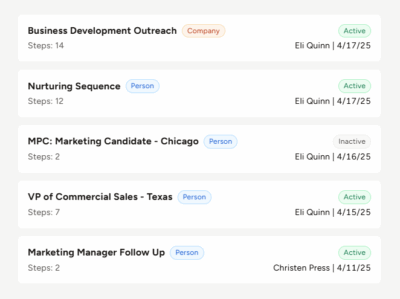As a search consultant, you don’t want to be “just another recruiter to your clients.” No way. Instead, you want to be seen as a trusted recruitment advisor. That’s one of the ways that you can fill more job orders, make more placements, and generate more revenue.
What is a recruitment advisor?
But before we start digging too far down into the earth, what’s a recruitment advisor?
A recruiter advisor is somebody who provides information, advice, and expertise to a company or organization regarding its talent acquisition practices, including how it sources candidates, interviews them, and closes them during the hiring process. This person can be an internal recruitment advisor, or in the case of a third-party agency, an external recruitment advisor.
The value of a recruitment advisor
Here’s the bottom line when it comes to being viewed as a recruitment advisor. You must provide value to your clients that does not necessarily result in you:
- Receiving a job order
- Making a placement
Now, of course, you’re providing this value in the hopes that it will eventually lead to more job orders and more placements. However, by providing value as a recruitment advisor, you’re changing the nature of your client relationships. That’s because you’re interacting with your clients even when you know that it won’t lead directly to a job order and/or a placement. That’s how you change the perception of being “just another recruiter.”
You’ve probably heard of the process of “making deposits in somebody’s emotional bank account.” Well, in this case, you’re “making deposits in your clients’ value bank accounts.” After a while, they’ll come to rely on you for all sorts of things related to hiring and the employment marketplace. They’ll start to view you as a source of valuable information and expertise, and more importantly as a problem solver.
Your clients want help solving their hiring problems, and those problems include more than just filling their open positions or hiring new employees. If you want to truly position yourself as a recruitment advisor, then you must solve as many of your clients’ hiring problems as you possibly can. Function as their guide and get them on the right path. As a professional search consultant, you must shift from being just a tactical recruiter who finds talent to a trusted recruitment advisor who develops successful talent strategies.
Then, when your clients need to fill an open position, they will turn to you and your recruiting agency. Because why wouldn’t they?
The Principle of Reciprocity
The bad news is that becoming a trusted recruitment advisor is not easy. (If it was, then everybody would be doing it, right?) No, it requires an investment of time, energy, and effort into your client relationships. However, this where you can lean on the Principle of Reciprocity. According to this principle, when somebody gives you something, you feel inclined to give them something in return. By the same token, when you give something to somebody, they feel inclined to give you something in return.
The key here is to be the first person to give something. As a recruiter and search consultant for your clients, you should give to them first. And you should also give to them often. This is the best way to position yourself as a trusted recruitment consultant. Don’t think that they have to give first before you give. That’s backwards thinking, and it’s not likely to get you anywhere. Or get you very far, at the very least.
Blueprint for becoming a recruiting advisor
So, now it’s time to get down to the nitty-gritty. In other words, what are the specific steps involved in becoming a recruitment consultant?
To discover these steps, we’re going to draw upon the wisdom of recruiting industry trainer Jon Bartos of Revenue Performance Management. Bartos is a premier writer, speaker, and consultant on all aspects of personal performance, human capital, and the analytics behind them.
According to Bartos, below are five ways that you can become your clients’ trusted recruitment advisor:
#1—Help streamline their hiring methods.
In this talent-starved market, the entire interview process should take from one to four weeks. No longer. No exceptions. The longer the process takes, the greater the chances of top talent accepting another position. They’re in high demand and they know it.
#2—Help them create a win-win interview process.
They should ask thorough questions to establish whether or not a candidate has the right stuff to join their team, while at the same time selling candidates on their organization via the all-important Employee Value Proposition (EVP).
#3—Develop a strong Employee Value Proposition.
This is a critical part of the business-adviser relationship. The EVP clearly states all the reasons why a candidate would choose to work for a company as opposed to any alternative. If a client cannot articulate an EVP, it is essential that you help them to construct one, and quickly. Culture, benefits, work environment, compensation, office location, management flexibility, and much more can go into a winning EVP. And in this tight market, it can mean the difference between top talent choosing your client . . . or your competitor.
#4—Help them think differently about job openings.
If your client has an ongoing need for specific skill sets within their organization, propose a “continual opening.” This is a great way for you to deepen your professional ties to a client. Establish an agreement stating that any time you encounter clearly defined skill sets in a candidate, you will bring that talent to the table. This is a symbiotic relationship, benefiting both client and recruiter. Your client will no longer be able to just hire when there is an opening. They need to hire when the talent is available.
#5—Emphasize the importance of flexibility.
Educate your clients on the virtues of flexibility in areas such as compensation, benefits, vacation, work schedule, and work location. This isn’t a market in which it’s wise to dismiss a candidate if he or she falls outside a given salary range or wants an additional week of vacation. Encourage clients not to lose candidates over relatively minor negotiation snafus.
According to Bartos, he once began a global procurement search for a Fortune 100 company by sitting down with the client and determining how much money they’d lost by letting this critical position remain unfilled for two years. The hard costs and missed opportunity costs they’d incurred were staggering—millions of dollars. “Once I’d helped my client see this clearly, it was amazing how flexible they became,” said Bartos.
Client-based recruiter training
Top Echelon offers a free monthly webinar as part of its Recruiter Coaching Series. After the webinars are over, we post the recorded version of the webinars in our Recruiter Training Library. These webinars touch upon a variety of recruiter-related topics. These topics deal with both candidates and clients. As always, our goal with these webinars (and corresponding videos) is to help recruiters make more placements.
Jon Bartos has multiple videos in the Top Echelon Recruiter Training Library. In addition, many of these videos deal with client-related topics. Some of these videos are listed below. Click on the title of each video for access:
- “Moving Your Clients Up the Value Chain”
- “Advanced Branding Strategies for Recruiters”
- “From Contingent to Mutually Committed Client Relationships”
In addition to training and webinars, Top Echelon offers other recruitment solutions. These solutions include the following:
- Big Biller recruiting software
- Top Echelon split network
For more information about Top Echelon and the products and services that it offers, visit the Top Echelon website by clicking here.









